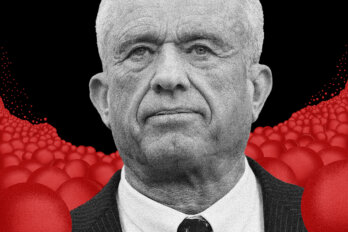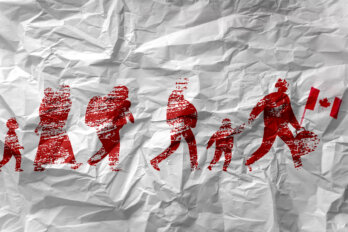Last year, I did something unexpected: I wrote a story about my high-school rape. I had never wanted to share details with family, my friends, or even other survivors, and I certainly did not want anybody to know how it broke me—an unclean breaking, not in half, but in chipped increments. Even as an adult, fifteen years later, fear and shame choked my words. By then, I’d starting seeing a therapist, but after a year, I still couldn’t bring up the rape, not outside of her office and not in our biweekly sessions.
As a journalist who often writes about women’s issues, my silence was especially difficult during the outrage over the Jian Ghomeshi sexual-assault trial and its takeover of the national conversation. Whenever anybody asked me what I thought, the words rested on my tongue, heavy and bitter. Then, a couple of weeks before Ghomeshi’s acquittal, including on four counts of sexual assault, I had a meeting with my editor in a downtown Toronto coffee shop. When our talk turned to the case, I lamented that the charged discussion meant women’s experiences were often, weirdly, muted. There seemed to be few pieces that illuminated what women meant when they used words like “trauma,” “re-victimization,” and “trigger.” This was unsurprising. Given the backlash against Ghomeshi’s accusers, few women wanted to come forward with their own experiences; fewer still wanted to go public using their real names.
I understood this because I was one of those women. And so, when I responded with I’ll do it—my own analog version of #MeToo—it was as if someone else had reached down my throat and scooped out another person’s warbling voice. I don’t remember much after my editor said yes. But on the streetcar ride back to my office, I vibrated like a tuning fork. My first thought was “What have I done?” I knew that once I told, my story wouldn’t be mine anymore. People could share it and dissect it; they could judge me and ask questions. I would be expected to account for my actions: what I did at the time, why I waited so long to speak out, why I never reported it. We’ve seen this process in high-profile cases, such as the evisceration of Ghomeshi’s accusers, of course, but also with the women who accused Bill Cosby, Donald Trump, Roger Ailes, Bill O’Reilly, and, most recently, Harvey Weinstein.
I barely told anyone what I was working on. But as the publication date loomed, so did my guilt. Writing it had forced me to talk about it in therapy. Now, I imagined my family and my close friends stumbling on the article and learning all the things I’d never been able to tell them. A few days before it came out, I told my mother what happened and what it did to me. The moment was nothing like the one I’d constructed, for years, in my head. Her compassion surprised me, even though it shouldn’t have. I also shouldn’t have been surprised that she knew something of what I felt.
Earlier this month, the New York Times ran a story about Weinstein’s long history of paying off his sexual-harassment accusers. His (now former) lawyer, Lisa Bloom, a high-profile attorney who’s famous for bringing sexual assault cases against men, fired back that one of Weinstein’s accuser’s stories had already been “debunked.” She also downplayed her client’s actions as simply “an old dinosaur learning new ways.” In a statement, Weinstein said he knew he needed to be “a better person” and he was creating a women’s scholarship foundation named after his mom. Shortly after The New Yorker published its own explosive story, Weinstein’s downfall was sealed. As actress Amber Tamblyn said in the New York Times, “Now that we have collectively spoken, we can never go back.”
It was in the spirit of that collective speaking that the social media campaign #MeToo mushroomed this past weekend. On October 15, actress Alyssa Milano tweeted a suggestion from a friend: “If all the women who have been sexually harassed or assaulted wrote ‘Me too’ as a status, we might give people a sense of the magnitude of the problem.” In twenty-four hours, the hashtag was tweeted over half a million times. Far from being uncommonly horrific, sexual harassment, violence, and coercion are a normal part of women’s everyday experiences. The problem is not limited to a few bad apples; it is pervasive. This doesn’t surprise me now, but it did when I was still silent.
There is a persistent narrative that if women divulge their experiences sooner and more often, we’ll solve the problem of rape and sexism at corresponding rates. We ask, “Why didn’t they come forward earlier?” forgetting that, in the case of Hollywood, women such as Rose McGowan did come forward and were dismissed. We forget that while we pay attention to accusers en masse, we tend to ignore them if they are alone. We forget that conviction rates are disastrously low and the reporting process is brutal. Most of all, we forget that so-called “justice” isn’t the only point of telling—sometimes it isn’t even the primary motivator. We also tell to let other women know they’re not alone. We tell to know we’re not alone. We tell to remind ourselves that it happened. We tell to diminish self-blame. As one woman who spoke out against Weinstein said, “You constantly question yourself—am I the one who is the problem?” And for all the women like her, who speak out under the spotlight, thousands more struggle to share their stories in their private lives.
Most survivors do, in the end, disclose. Some studies show that number is as high as 90 percent, while others peg it closer to between two-thirds and three-quarters. Less than half of those women disclose within the first three days, and up to one-third wait a year or more. Disclosure is a broader act than reporting: it can mean telling a friend or family member—it can mean tweeting #MeToo. Reporting rates to police are significantly lower: estimates hover around 35–40 percent of total estimated cases. It’s not hard to understand why so many hold off reporting. We’re not just afraid of scrutiny, we’re afraid our telling won’t matter.
When it comes to reporting to authorities—whether it’s the police or, say, someone at your workplace—the act is unlikely to be repaid with justice. Out of every 1,000 rapes, for instance, only six rapists will be incarcerated, according to data from the Rape, Abuse & Incest National Network (RAINN) in the US. Women who face harassment in the workplace rarely fare better. A joint study 2016 between the UK-based Trade Union Congress and the Everyday Sexism Project, for example, found that half of all 1,500 women surveyed, and over two-thirds of women aged 18 to 24, have experienced sexual harassment in the workplace. The vast majority of them feel they can’t report it, but nearly three-quarters of those who did said that nothing changed. One shocking detail is that for 16 percent of women who did speak up, things actually got worse. Unlike telling a friend or a family member, when you may just want to unburden yourself of the secret, officially reporting comes with both the hope there will be consequences for your rapist and the knowledge there may be payback.
And still, whenever an influential man’s bad actions are revealed years after the fact, anti-rape groups and pundits rush to explain. Post-Weinstein everyone from Bustle and Entertainment Weekly to the Guardian and NPR ran stories with headlines such as “Why it took so long for accusations against Harvey Weinstein to come out” and “Why did no one speak out about Harvey Weinstein?” Often, these articles seek to remove blame—to protect those women who finally spoke out by showing us the cost. The message is both “We need to speak out” and, also, “But when you do, this is what you bear.”
Sometimes I wonder, though, whether this attempted protection of survivors comes with an unintended side effect: it not only elevates but also confirms our women’s fear. We don’t talk as much about how telling can, in fact, be healing—or how it can be different from reporting. Reporting implies a public purpose, an action that seeks a specific solution. But telling can just mean sharing with anyone you trust. Telling can exist to break stigma, to help form a community, to eradicate shame. Telling can exist for no other reason than to find the strength in admitting, “It happened to me too.”
The night before the article about my high-school assault was published online, I couldn’t sleep. I lay in bed with my body straightened into rigidity. I worried about name-calling and backlash. And why wouldn’t I? I’d seen women swarmed on social media time and time again. I worried about how my colleagues would react, how the family members and friends I hadn’t yet briefed would react, how this would be out there now to define me for anybody who could Google. When I woke up from my fitful sleep, it was to the flashing blue of my phone, alerting me to my first email from a stranger. Subject: “Thank you.”
That was not what I expected. I sat up slowly, hunched over my phone at 7:33 a.m. on a Saturday morning, two days before my thirty-second birthday, compelled to hide this moment from my partner, snoring loudly beside me. Because even though this email seemed promising, I was scared. “[I] want to thank you for articulating so well a story that so many of us live and lie about,” the email opened. My heart thudded wildly. The email writer, a woman, went on to thank me for sharing my soft “underbelly.” She said she was sure that sharing my story would be a way for others to finally open up to friends and lovers about their own stories, their own shame.
She was right. In the following days, my email and Facebook inboxes flooded with stories from women who said that, after reading my story, they finally told someone what happened to them. One young woman in Australia booked her first ever therapy appointment. Another woman wrote that her shame was thirty years old—almost as long as my entire lifetime. She couldn’t believe that someone had finally articulated her feelings. She hoped that my story would “give her the strength to find the help [she] need[ed].” Another woman wrote that after reading my piece, her own “personal story and history became very conscious.” Every day, she thought about the fact that she couldn’t tell her two daughters their father, her ex-husband, had once raped her.
I heard from others like her, women whose partners had assaulted them, and I heard from women carrying secrets of childhood molestation. I’d written the piece to tell those with no experience of rape what it was like—I never thought it would give other women permission to tell what had happened to them. I never thought there were so many others like me, craving reassurance that we were not the only ones who felt that way, craving reassurance that we weren’t the only ones afraid to tell. I tried to answer every message that came in, but I couldn’t keep up.
Shortly after all this, I flew to BC for my grandfather’s funeral. Among my relatives, the story had spread like wildfire. Some had already reached out with love; others were angry I hadn’t said anything before. They tried to reconcile what they read with what they knew of me. Grief for my grandfather knotted up with apprehension as I walked off the plane. I felt like the word “raped” had been branded on my forehead. An hour later, my grandmother requested some time alone on her pristine floral couch. “Why didn’t you say anything?” she asked me. Panic bloomed in the long silence between us. “Did you think you were alone?” She wasn’t trying to shame me; she was trying to let me know the sisterhood I had missed out on in my silence.
Since then, I’ve been featured in a Nature of Things documentary about PTSD. I’ve been asked about my rape on live radio, during guest lectures at universities, at parties, and at conferences—sometimes, that’s what I’m there to talk about, but more often it isn’t. I’ve seen a still shot of the article, with my face, go up on a giant screen at an industry awards gala, removing all hope that some people still don’t know.
As much as I’ve found healing in being “the rape girl,” I still sometimes yearn for what I gave up: my silence. Telling, I’ve learned, can generate its own momentum, and it’s something you’re expected to do over and over again—no matter how exhausting it can be. But that desire for silence is in the past—resting with another version of me that allowed herself to be defined by it. Every time I talk about my rape now, my voice feels like my own, the shame smaller. One day, I hope, this telling won’t have to be so public; it won’t be a fight. We won’t have the pressure to prove to everyone that rape is real.
Some feminist scholars believe the public is gluttonous for women’s trauma. I think that’s part of it. But women themselves are also gluttonous to see their own lives represented and reflected. They’re starving for assurance that you can tell and that there will be a point in that telling, a healing, a connection—for them and those around them. After the documentary aired, I heard from still more women. One wrote that I was brave for putting myself out there. “Please know that it really is helping people,” she said. “I hope that it helps you too.” It has. It does. Every day.




